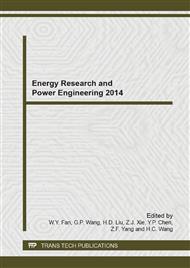p.1422
p.1426
p.1431
p.1437
p.1443
p.1449
p.1453
p.1457
p.1461
A Quick Detection Approach of Magnetic Iron Grade for Magnetite
Abstract:
In order to achieve aims of rapid real-time monitoring iron grade during sales process or mineral processing for the iron ores, a quick detection approach to magnetic iron grade of magnetite based on electromagnetic induction is explored in the paper. Information acquisition head is focused on an iron grade sensor, and the iron grade sensor is made up of coil-windings with magnetite core. Information acquisition circuits are given adapting mode of the transformer bridge type rectifier, and construction of the head is designed and machined. Testing mechanism is analyzed from the angle of magnetic field analysis, and the magnetic field model is also built up. Furthermore, magnetic iron grade of some testing samples are measured by the detection device above. It is showed that when the grade range of the magnetic iron of magnetite is varied from 20% to 65.3%, deviation is lower than 1.0%. By research above, it is shown that the detection method of iron grade based on electromagnetic induction is feasible, and it is also significant for improving the total testing level of mineral processing fields.
Info:
Periodical:
Pages:
1443-1448
Citation:
Online since:
July 2014
Authors:
Keywords:
Price:
Сopyright:
© 2014 Trans Tech Publications Ltd. All Rights Reserved
Share:
Citation:


